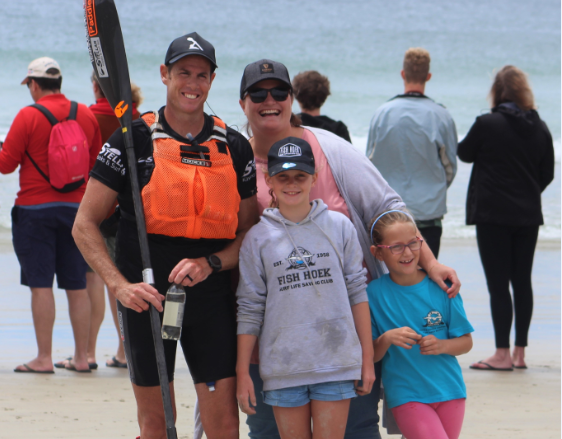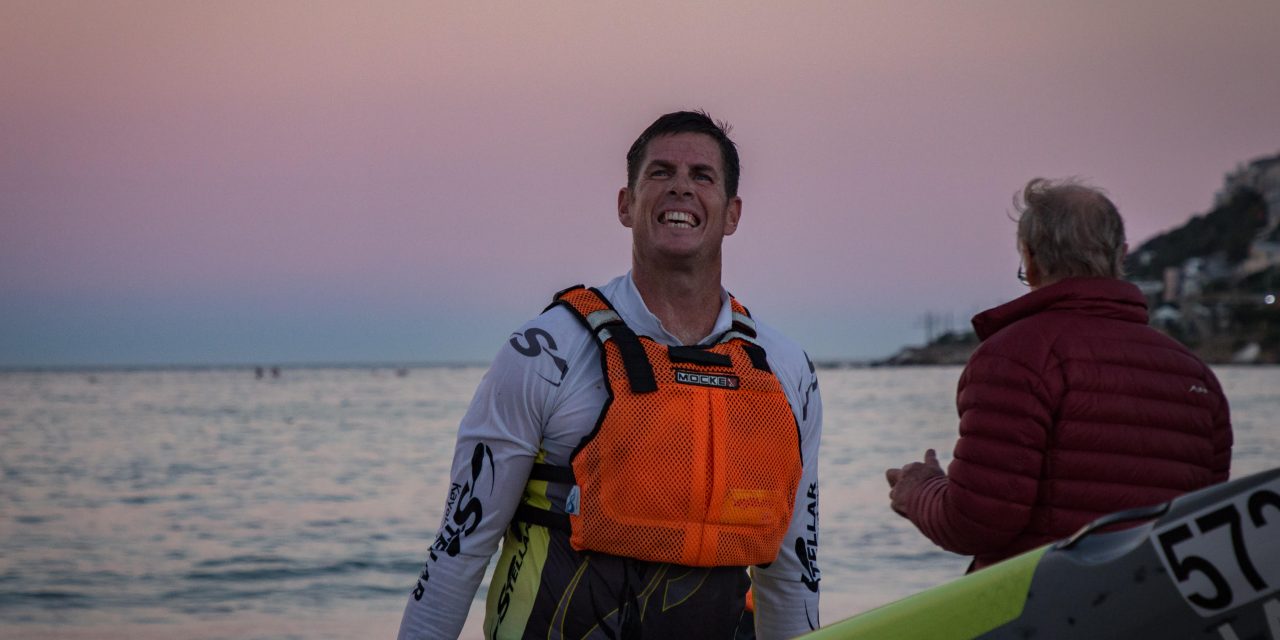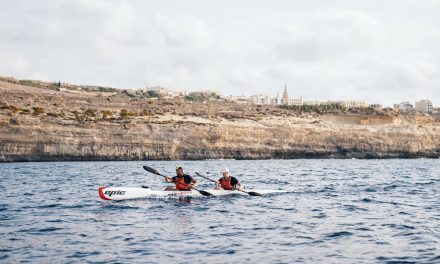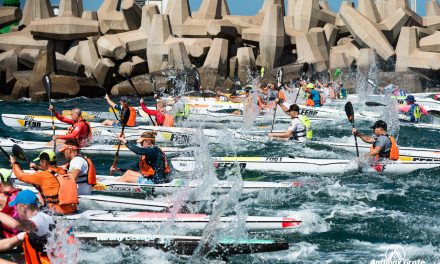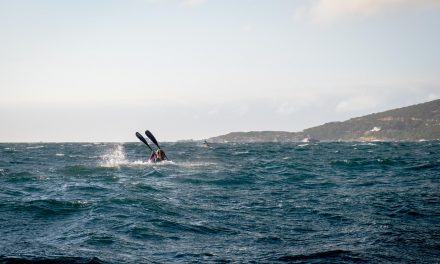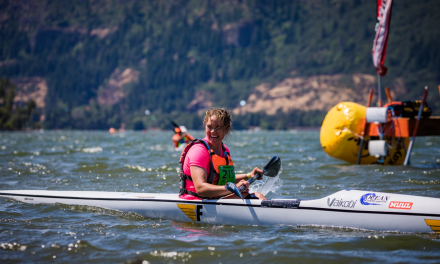IN THE BOAT with: IAN BLACK
When The Paddler asked Ian Black to pen an In The Boat piece, his first response was, “why?” He may not have the world championships of some of the other contributors, but his story is arguably far more powerful.
Ian is a top ten finisher at some of the biggest races across the world and is deeply respected by his peers. But it’s the everyday paddler that may take the most out of his incredible journey.
I can still remember the exact moment it hit me.
February 2016. I was 106 kilograms and sitting on the bank of the river watching my mates have the time of their lives competing in The Dusi. In another world, I would’ve been right there with them.
But while they were all super fit and super happy, I was on the other end. I look back at that time of my life and the only way to describe it is “frustrating”. I had changed careers five times in the previous six years while my health – both physically and mentally – yo-yoed tremendously.
After 4 days of spectating in ridiculous heat and rain, I was super grumpy. I decided there and then that I needed to do something drastic.
That’s when I reclaimed control of my life.
It hadn’t always been like that. Like a good few paddlers to come out of the greater Fish Hoek area, my relationship with the ocean started in surf lifesaving. First as a nipper and then, years later, as a paddler. We learned in spec skis, designed to race around the cans, and that was about as far as we went. For the next few years that’s all it was – buggering around in club boats and racing around the cans.
That was until one Friday evening late in 2001, where Pete Cole (at the time Pete was the best surfski paddler in Cape Town, an unofficial coach and Cape Point Challenge advocate), talked my brother and I to do the 35 km qualifier for the upcoming Cape Point Challenge. I am convinced to this day that Pete’s motive was just to make sure that two girls that he was coaching wouldn’t be the last boat to the beach the next day. We completed the paddle and managed to qualify. Somehow, we were even convinced to commit to the race.
My brother, then 15, and I at 17 took on the gruelling 56 kilometre battle in stiff winds and massive swell. Hardly an easy introduction, and being brothers we had more to overcome than most in the race. I’ve now done 12 of these events and that first one was still the roughest conditions I have experienced. I admired the elite paddlers and more so my mate Simon who, in his Cape Point debut, cracked the esteemed top 10 at 16 years old. The seed was planted.
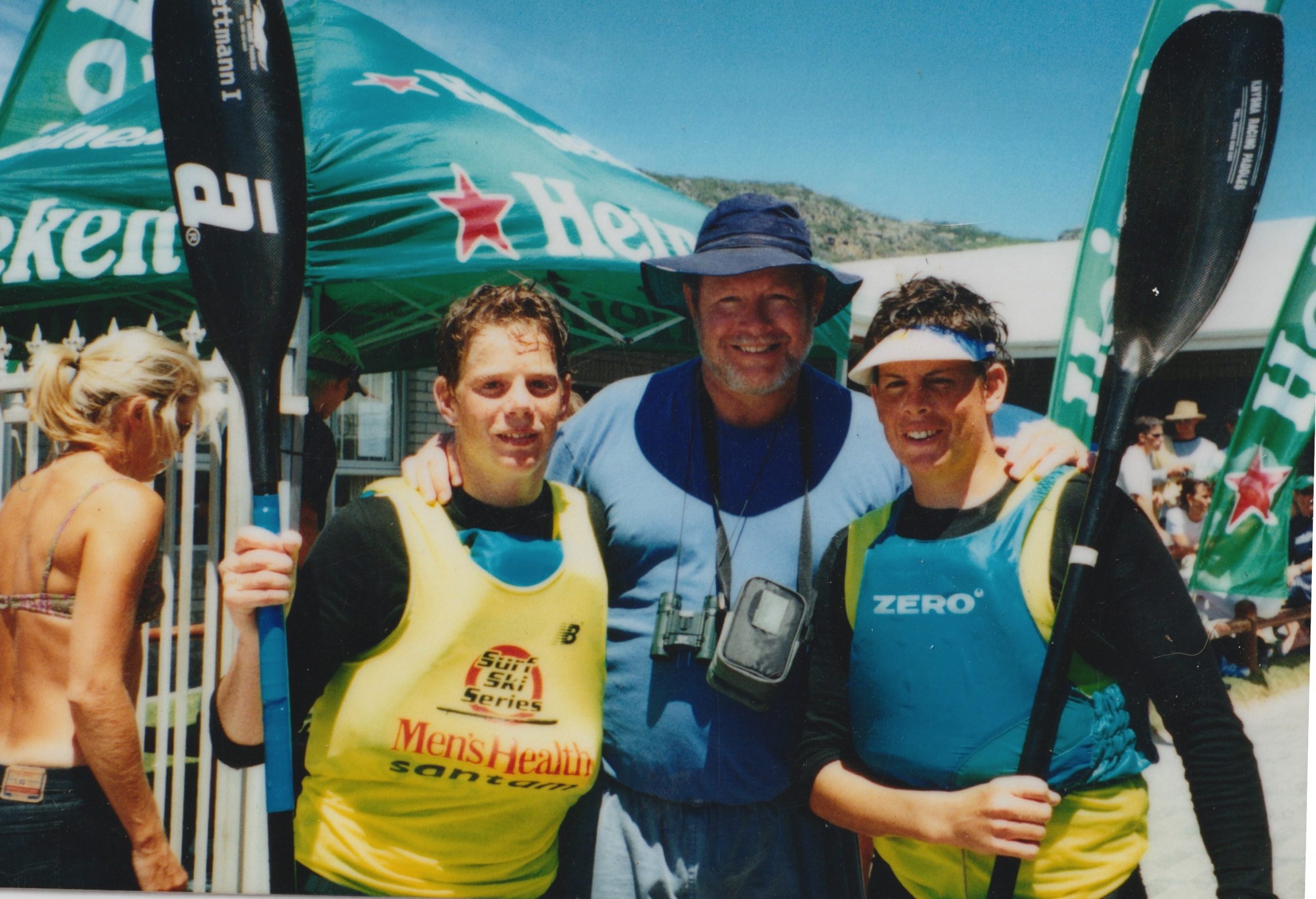
For the next two years not much changed. At one point I told my parents I wanted to quit lifesaving, I was more interested in surfing and doing regular teenager things – like stealing my dad’s car. Mom said “ok, but then no surfing.” This was probably the most impactful piece of parenting my mother did for me, sticking it out would eventually set the path for the rest of my life.
I started canoeing in 2003 and did “The Berg” that year, training with Pete and Alexa Cole (nee Lombard). The couple had a small, unofficial yet committed training group with strict “rules” about training. Basically, you couldn’t stuff around. You were either in or out, the epitome of the FIFO principle. For Cape Town paddlers, summer was for surfski and winter was for river races. I did Cape Point in 2003 and 2005 and the Berg from 2003 to 2006. There were a bunch of others in between, but those were the events that required a lot of honest work, especially for a lessthan-average, immature me. They teach you lessons for life.
A massive influence for me in those years was the legacy of paddling that surrounded Fish Hoek Lifesaving Club and Peninsula Canoe Club. Guys like Pete & Rory Cole, Paul Marais, Graeme Solomon, Ant Pearse and Keith “Sporty” Anderson. Sporty died in 2005, but just about every time I drive to Miller’s Point for a downwind, I can picture 7 or 8 of us crammed into his car talking shit. He had a lot of time for the young guys and showed genuine interest in what we were up to.
My parents, my father in particular, were hugely instrumental in those years. I had messed around at university, dropping out, twice, yet they were relentless in their support both financially and emotionally. My dad had been a rugby player (and my brother was heading that way) so it was even more significant for me to have his support in a sport he had very little to relate to. They paid for entries and subscriptions and dad drove us out to the river every weekend in winter, sometimes waiting hours for us to trip the river after doing a race.
I also met my wife in this time. I wouldn’t have guessed it at the time, but we would go onto to be married with 2 kids. Gaelyn was patient and supportive of me from day 1. It played in my favour that both her father and her uncle were legendary Fish Hoek Surf Lifesavers.
2007 was a breakthrough year for me. Cape Town had a summer series organized by the legendary Billy Harker consisting of 10 races leading up to the Cape Point Challenge. In 2007 I finished second to Pete Cole in the series, with podium finishes in a few races including a close second to the legendary Paul Marais in a downwind race. I had picked up a boat sponsor (I was made!) and looked set for a top 10 finish at Cape Point Challenge. Unfortunately, within the first 3 km of the race, my rudder fell out and I limped to shore.
It was around that time that things began to turn.
A fall out with close friends and business partners effectively pushed me away from paddling in 2008. I dabbled with it still, but I was oblivious to how far from fitness I had drifted. In the words of Billy Harker, I had become a “pork sword”. I got involved in other sports, but wrecking my knee playing rugby quickly put an end to that. For the most part I was adjusting to becoming a “real” adult with a wife and two kids.
I didn’t realise how unhappy I was until early 2015. My mates were all super fit and having fun, but I was on the other end. I had broken my arm mountain-biking so really was not able to do anything I enjoyed. Overweight at roughly 120 kilograms at that stage and not fulfilled at work, I began looking at alternatives.
That’s when I saw an ad for a sales and marketing post at MOCKE Ocean Gear. The position would mean a significant decrease in earnings and benefits but presented a substantial gain in family time and lifestyle and of course the chance to get back into the boat. My letter of application was titled “I am a fat paddler, but a paddler nonetheless!”. I applied and got the job.
Naturally, part of it involved paddling a bit. I spent the next few months preparing for Cape Point Challenge again. I lost weight and got fit, but I was still restricted by the notion that my heyday was back in ’07 and that was as good as it would get. By December I convinced the race director to allow me to start in the elite batch. Needless to say, I was dropped in the first 3km and paddled the rest of the way on my own.
That’s how I found myself at The Dusi and at a crossroads in life.
I had two choices: continue on my current unfulfilling path or make a commitment to the changes I wanted to see.
Thankfully, I opted for the latter. I didn’t know what I was training for, but I just knew I had to train. By the following Monday – because all programs start on a Monday – I knew what I needed to do.
There were a few things that had to happen for my plan to be successful. The first being that I had to run. There was no way around it. I had tried to cycle to lose weight and it just didn’t work. My dodgy leg made running a real challenge, while also putting massive strain on my lower back. I started off doing 4-5km at 6min/km but stuck at it. Within two months I was doing 8-10km at 4:40/km.
I mapped out a training schedule – something I still do today – and stuck to it. There’s something extremely satisfying about getting to the office in the morning and checking the day’s session off with a yellow highlight on my excel spreadsheet. I felt it was important to move at my own pace, so I did most of the work on my own, and that wasn’t easy. After one crappy winter’s paddle I was feeling pissed off with myself, only to check the schedule and realise I had gone 17 weeks without missing a session. I was on track and had begun to find a good balance between work, training and family.
Around this time Dawid told me that he was going to take me to Hong Kong for the Dragon Run that November. I wasn’t convinced, but I raised my game nonetheless. I drew a lot of inspiration from podcasts and biographies; my theory was that I had to give myself the best opportunity to make things happen. I couldn’t go if I didn’t have a passport, I couldn’t do well if I didn’t train. So, I got a passport and I trained my arse off.
I raced to a top 10 at my first international surfski race, close behind and in the mix with some of the best paddlers in the world. Feeling on top of the world, I gave the Cape Point Challenge another crack.
On the day, things were going to plan until around 35 kilometres in. Boats began moving on my inside at pace. I was on the right line, but I just wasn’t going anywhere. That’s when the wheels began to fall off. I couldn’t find rhythm and started to overheat. Within minutes, I was over it. I was just about crying. I swore that if a rescue boat came within earshot, I was on it and going home and never paddling again. At one point I tried to break my paddle over my knee so that I had an excuse.
When I couldn’t break my paddle and there weren’t any boats to climb on to, I started talking to myself. I pictured my kids standing on the beach waiting for me and then me walking up behind them with a DNF. I thought about the hours that my wife had looked after the girls while I got to train. I thought about all the mornings that my wife had got the kids ready for school while I was on the water. They were under no illusion that I was going to win the race, but Gaelyn knew how much the race meant to me and how desperately I wanted a top 10. I knew how disappointed we would all have been I have had not given it everything.
And with that, I told myself: “you have done the work, you know what to do, do it.”
And off I went.
With 1500m left, I didn’t know where I was coming, but knew it was close to my goal. I could see 2 guys ahead of me that I had pegged to be top 10 so I chased them hard. I caught one with 100m to go and we had a sprint up the beach for 7th. I had done it, a gold at Cape Point.
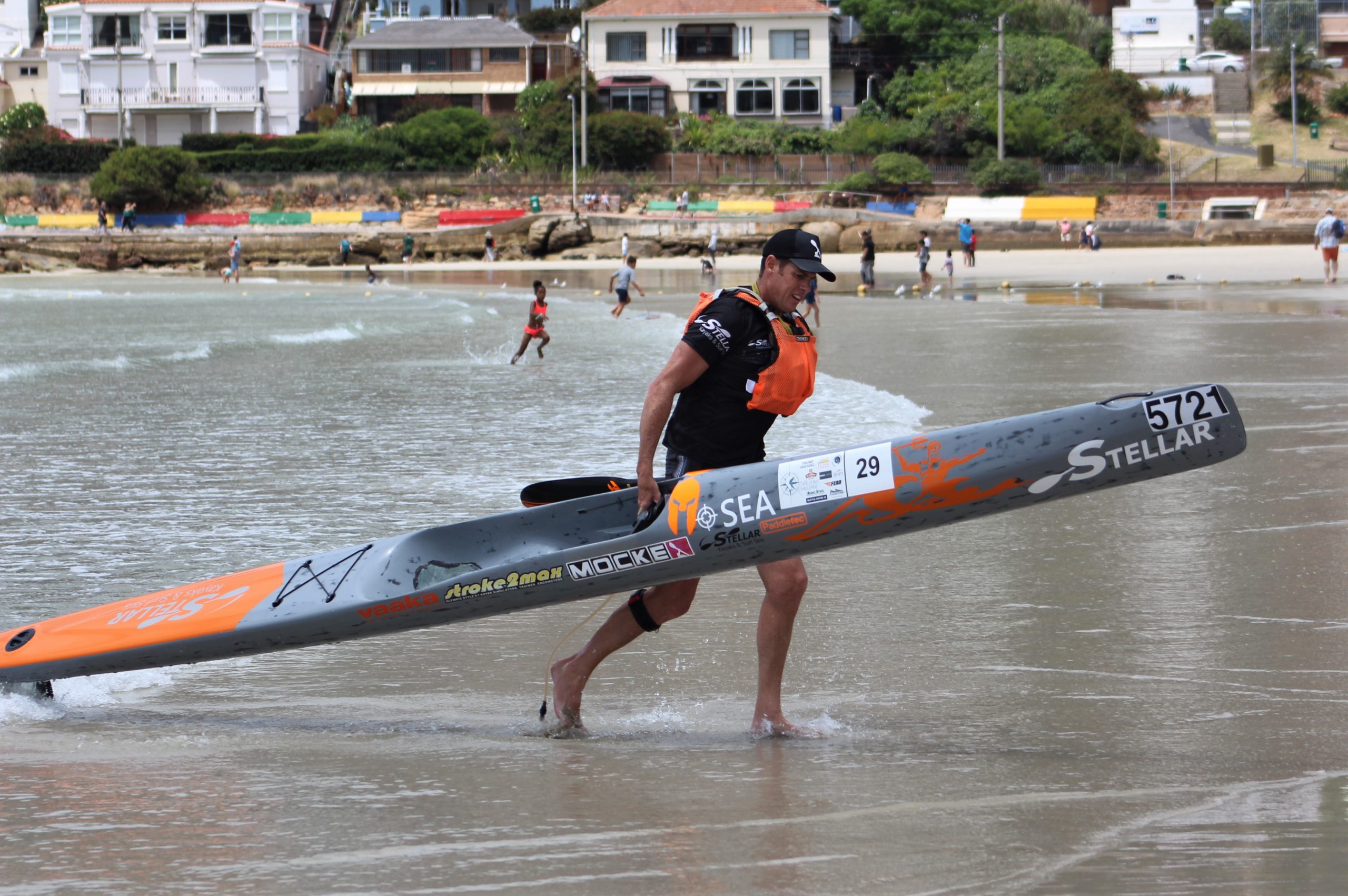
I joined the incredible team at Stellar Kayaks soon after and their passion and dedication to the paddling fraternity has since taken me all over the world. I cherish every single second.
I remember reading an interview that Hank McGregor did a few years ago and the words have stuck with me. “If you want to be professional, you have to act professional.” I may not be a fully sponsored, world title-holding athlete, but I have made a commitment to my sponsors, to my family and to myself to be the best version of me. So, with that in mind, I do my best to stay fit, to work on weaknesses and to give myself the best opportunity to succeed irrespective of the grade of an event. I have tried doing the “social” paddling thing, and by that, I mean racing around at full tilt with my 10-year-old daughter in the back of the double, and that is where I confirmed that “social” sports don’t exist. We all have a race to win, whether it is on the water or otherwise. No one steps onto the start line without an agenda – even as small as it may be.
I have learned that no matter where in the world I paddle, paddlers are all the same. We all share an immense appreciation, respect and love for the ocean, our families & friends and competition. I look forward seeing the friends I have made through paddling at the events I go to. Sometimes it’s just a quick chat before or after a race, other times it can be beers or coffees and long conversations, but every time it feels like just the other day that we last caught up.
Over the past 4 years I have learned a lot about myself and what I am capable of and do my best to show my kids that they can do anything and go anywhere if they put the work in. I am grateful to my wife who patiently and selflessly supports me through the early mornings, late evenings and sometimes whole days or weekends that evolve around paddling.
I often think back to that trip to the Dusi, and in particular the drive home, when I started planning just how I would turn my life around. I know there are others in that same position right now and my advice to them is simple – do it.
Figure out what it is that you want, and make the move. Of all the things I have done in the past few years, making that decision, at 32, to create my own opportunities is the one I am most proud of.
Those who know me are aware that I love the banter and have a short fuse… but if I can cop the chirps on the water from all of the guys and still get on with it, then anyone can!
